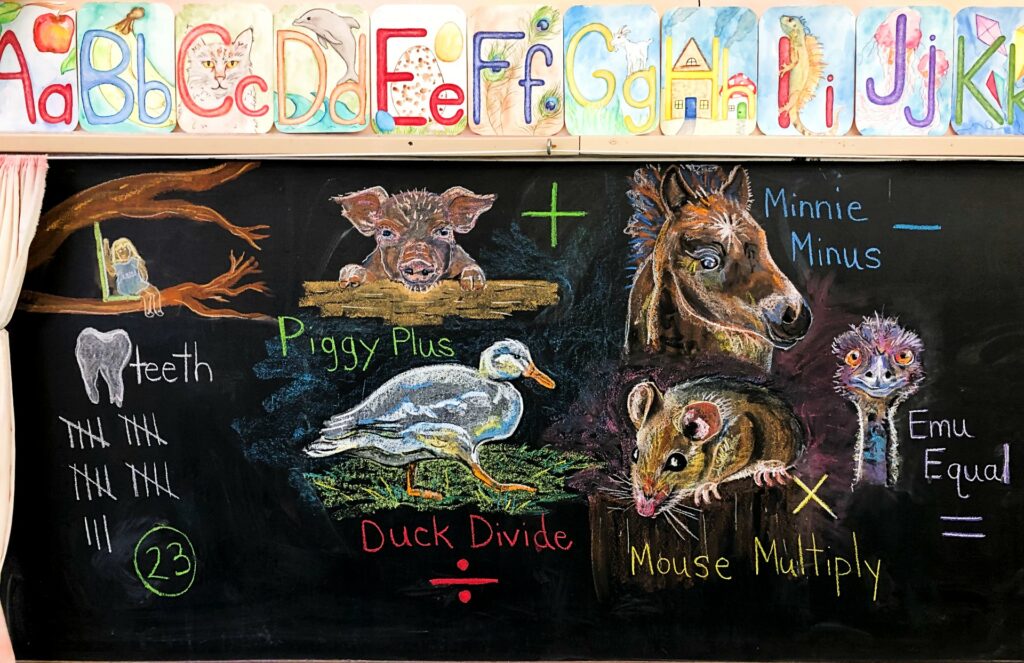Waldorf Essentials

Spring Garden Waldorf School offers students rigorous academics in a developmentally appropriate environment. We aim to make learning enriching, relevant and meaningful to help students develop intrinsic motivation and inspire a lifetime of learning. Our approach considers and caters to each area of a child’s three-fold being — their body, mind, and unique spirit. It is our role to inspire these elements and provide the lessons and environment that help students develop their full potential. Here are the essential elements of a Waldorf Education.
Waldorf Education Is…
Developmentally Appropriate – We provide the right learning experience at the right time, meaning curriculum matches child development. In practice, this looks like play based learning in preschool and kindergarten, a creative, multi-disciplinary approach to early academics, and interrelated experiential curriculum for our older students. It means 3 recess periods a day and many lessons outdoors and out of chairs. There is no testing, few worksheets and little homework before Grade 4. Child development research supports this model of learning. Education is not a race.
Hands On – We believe children learn by doing. This “hands on” learning is really full engagement learning — head, heart, and hands — which is why Waldorf Education engages children in a challenging and multi-sensory environment. All facets of curriculum seek to inspire cognitive, social, and creative engagement in our students. In practice, this looks like third graders learning measurement, fractions and geometry basics through a building project that serves to meet a need at the school. Many of our sheds, playhouses, benches and more have been built by our engaged, intelligent third graders. Each grade engages in these types of meaningful lessons throughout the school year.
Relevant – Relevancy inspires intrinsic motivation and deeper learning. Statements like, “Why do I have to learn this? When will I ever use this?” are rarely muttered here at Spring Garden. In practice, a student learns botany while gardening, which helps them immediately see the reason why one must know how a seed develops and sprouts. When you try and lift a heavy desk in the easiest way possible, physics become relevant in a class-made pulley system in Grade 8. All subjects are taught in this manner.
Intrinsically Motivating – We strive to help children learn to love learning and learn to do their best without accolades. We want them to learn, not for an external reward, but for the rewards inherent in learning – mastery, confidence, grit and pride. In practice, this means that Waldorf elementary students do not receive grades. The feedback given is given not in comparison to peers, but to self. Students also are not subject to judgement based on standardized test results.
Character Centric – Waldorf educators focus, starting in Early Childhood on developing the whole child — head, heart, and hands. The heart is our character and emotional intelligence. Character education is not old-fashioned. Its elements — empathy, determination, cooperation, and responsibility — are integral to success. In practice, our teachers help young children take their will, strong and determined, and apply it to others in a cooperative and respectful way. Teachers help primary students focus on community development and mutual respect between peers in the classroom community. Older students are asked to consider and discuss character development personally, and in society at large, as we take on personal, historical and modern day issues in class.
Enjoyable – Your child spends 7 hours a day on our campus. School will not always be fun, but we believe it should be an overwhelmingly positive experience. In practice, we take care to cultivate curriculum to integrate activities children naturally love — physical activity, art, music, movement and the outdoors — with the academic essentials of science, math, reading, writing and foreign language. Perhaps most importantly, recess remains, 3 times per day for all students in all grades.
Does It Work ?
Yes! Waldorf’s unique style of multidisciplinary teaching yields graduates with remarkable critical thinking skills and character, so that they can adapt to a wide variety of situations and contribute to the world in a meaningful way.
The Harvard Education Letter addressed the effectiveness of Waldorf Education and found Waldorf methodology implemented by Bill & Melinda Gates in several public schools helped, “test scores rise dramatically.” The letter also noted that: “Waldorf students tend to score below district peers in the early grades and then catch up…by eighth grade 89% are proficient or advanced [compared to 56% of their public school peers].”
Waldorf students shine, even more, where it matters — outside the test bubble. The book, Into the World: How Waldorf Graduates Fare after High School, “Surveys of over 1,000 Waldorf high school graduates from 1990 through 2017 provides ample data about the college accomplishments, degrees earned, and careers pursued by those who graduates in this 25 year period. Data is compared to identical or similar data with the National Association of Independent Schools (NAIS). In addition, individual interviews with graduates and their Waldorf teachers provides a lush narrative about the paths followed by those with a Waldorf education, both during college and after college.”
